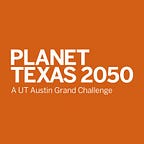Can We Leave It All Behind?: A “Not Even Past” Collaboration
By Adam Rabinowitz
As part of the Institute for Historical Studies’ “Climate in Context” events, Planet Texas 2050 has teamed up with the digital magazine “Not Even Past” to release a series of articles highlighting how history and archaeology are key to our understanding and mitigation of the devastating effects of climate change. “Climate in Context” is a year-long program of talks and workshops that look at how human interaction with the natural world has changed over time and what valuable information that can provide for addressing our current conditions. Here is a look at the second installment of the series, which explores how Planet Texas 2050 is studying past civilizations to understand how people responded to droughts and floods.
In the past, changes in sea level, droughts, erosion or sedimentation, or flooding have led to the abandonment of settlements. Those ruined towns and cities bear witness to environmental changes that left them unsustainable.
But the people who lived in them didn’t simply die or vanish. They moved. We can read this movement in the old settlements scattered across the landscape, but we can also read it in our own DNA, equally dotted with the evidence for past migrations.
For all of our history, mobility has helped to ensure our species’ success. If the mosquito problem in our neighborhood was too much to bear, we left. But as more and more of the world’s population lives in cities, as more and more of our infrastructure and wealth is invested in those cities, and as our national borders harden in response to population movements driven by the ancient impulse to flee from danger, this option is increasingly fraught with conflict and risk.
As part of Planet Texas 2050, Classics Associate Professor Adam Rabinowitz has sought to find ways to bridge the divide between the distant past and the present, and to show how previous human experience is relevant to our future. His new flagship project, “Stories of Ancient Resilience,” focuses in particular on the ways complex societies in the past responded to climate change and pressures on shared resources like water — issues that today’s cities are grappling with.
Read more from Rabinowitz in his blog post for “Not Even Past.”
Please join us on this journey.
Planet Texas 2050 is a research grand challenge at The University of Texas at Austin. We’re a team of more than 150 researchers across all disciplines working together over the next decade to find ways to make our state more resilient in the face of extreme weather events and rapid population growth. Follow us on Twitter, visit our website, and come back to our blog for updates.
Adam Rabinowitz, Ph.D., is an associate professor of classics and is the assistant director of the Institute of Classical Archaeology at The University of Texas at Austin. He is also a founding Planet Texas 2050 grand challenge researcher. His work focuses on understanding how climate and environmental change affected past civilizations and applying those lessons to urban areas today.
